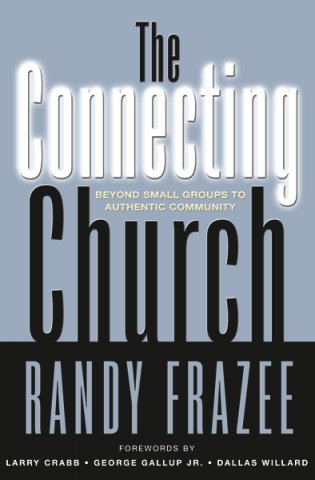 In my experience, churches have failed dismally in the area of providing learning opportunities to their members. Please don't get me wrong here...many churches have great learning opportunities, in person, one, maybe two, days a week. Typically, however, as it pertains to online opportunities, churches typically only provide the Sunday Morning message as a podcast, and that's it! It is true that some churches have more elaborate children ministries' resources for parents and children. Yet, for the most part, opportunities for teens are typically centered around social media (if at all) and for adults, abismally non-existent. Education pastors design and develop curricula, possibly even publish the curriculum. Rarely, however, do churches provide online member areas to provide more than just the sermon podcast. Churches rarely integrate the sermon with supportive learning exercises during the week.
In my experience, churches have failed dismally in the area of providing learning opportunities to their members. Please don't get me wrong here...many churches have great learning opportunities, in person, one, maybe two, days a week. Typically, however, as it pertains to online opportunities, churches typically only provide the Sunday Morning message as a podcast, and that's it! It is true that some churches have more elaborate children ministries' resources for parents and children. Yet, for the most part, opportunities for teens are typically centered around social media (if at all) and for adults, abismally non-existent. Education pastors design and develop curricula, possibly even publish the curriculum. Rarely, however, do churches provide online member areas to provide more than just the sermon podcast. Churches rarely integrate the sermon with supportive learning exercises during the week.
Yes, there is power in the preaching of the Word of God. Recently, my own pastor of a larger church in Atlanta admitted from the pulpit that he doubts that any of his sermons will be remembered. Yet, he believes that the sermons in totality over the course of a year or more will have an impact. What if his sermons can have even more of an impact through online supporting materials? Journal questions? Discussion boards? Supportive online inductive Bible Studies? Etc. What if?

Almost any full-time Evangelist would admit that their job is "easy." It's easy to go in and preach and leave. They, however, would also admit that the difficult part of their job is knowing whether the church will effectively follow-up with the fruit of their labor. Many times, people fall through the cracks. So I am suggesting that online activities and opportunities, such as "I'm a new believer. Now what?" kind of courses. Just as new hire orientation greatly helps organizations orient new employees to their culture, the church can do something very similar.
Recently, I was contacted by one church who wanted to do a series where they gave the sermon, provided extra videos for Monday through Wednesday with follow-up discussion questions for their small groups Tuesday through Saturday. It's the first time they've done this! What a great idea! One very similar model would be Pantego Bible Church when Randy Frazee as described in The Connecting Church. They integrate the sermon with their community group curricula so that the big idea or the main proposition is studied through the week at different levels/depth, embodied, and thoroughly learned. So instead of the believer being bombarded with all sorts of knowledge on Sunday AM, Sunday PM, Wednesday PM, and any other day. It's tragic that though churches offer so much learning opportunities, the body of Christ in America is becoming more and more biblically illiterate and unaware (from Dallas Theological Seminary survey but supported by Barna here and here).
They integrate the sermon with their community group curricula so that the big idea or the main proposition is studied through the week at different levels/depth, embodied, and thoroughly learned. So instead of the believer being bombarded with all sorts of knowledge on Sunday AM, Sunday PM, Wednesday PM, and any other day. It's tragic that though churches offer so much learning opportunities, the body of Christ in America is becoming more and more biblically illiterate and unaware (from Dallas Theological Seminary survey but supported by Barna here and here).
Now, if churches would provide online modules to supplement the sermons, life change can be reinforced during the week thus making a deeper impact and a deeper change. Furthermore, besides further formal (courses and workshops) or informal learnings (such as journal/reflection questions, more videos, other podcasts or presentations, blog entries, etc.), if churches provide discussion boards/forums (via bbPress) or various social online situations (BuddyPress), immense growth can happen, maybe even have exponential, grassroots growth. Not only can spiritual growth take place, if an authentic and dynamic community can be encouraged and managed, then the church becomes even more connected...more like the church. However, in larger communities and cities where members are greatly dispersed throughout the city (and with traffic as bad as it is in Atlanta!!), having an online arena would be a great place to connect during the week. Instead, churches depend on email newsletters (e.g., MailChimp & Constant Contact), and well...I have no idea what else.
Recently, a friend of mine developed a site for pastors to network about small groups, Small Group Network utilizing BuddyPress and bbPress. From their site,
Founded by Steve Gladen, the Small Group Network is a free world-wide network for leaders of small group ministry. Our goal is to provide these leaders with relevant information and resources while connecting them to each other so that they might build relationships and encourage one another in creating healthy small group ministries.
However, I believe this is completely doable with churches (Now the caveat with churches will be to determine the legal ramifications, forum moderation, etc. for extensions like BuddyPress and bbPress).
Many churches have classes or workshops for new members and new believers. However, they are often at the worst times. For example, my wife and I have been trying to become members of a church in Atlanta, but due to our schedule, due to sickness and other random circumstances (sometimes our fault even), it has been over a year since we began "trying" to become members. However, membership class is only offered either once a month or once a quarter. What if the church provided some online modules (via a Learning Management System, or also known as a LMS) and then only one Sunday morning discussion and conversation to finalize the memberships. This could be slated for one of the Sunday morning hours rotating elders and pastoral staff as needed/desired. In this manner, instead of a bottlenecked entry point, becoming members is entirely dependent on the member-to-be.
This can be done in WordPress alongside a church's WordPress website. If the church wants to accomplish a course-like feel (like Moodle) then consider what Chris Lema just wrote about in his recent elearning post. The other approach would be Learn Dash, which I haven't tried or tested. WooThemes will be releasing Sensei this month, which I am excited to see. WooThemes was nice enough to give me the plugin to test today, so I will be writing about it soon!
Yes, I can hear it now..."We like to have the interaction." Or, "We like to see their faces." Or, "As the church, we should be rubbing shoulders with one another." Yes, very true. But how much interaction really takes place at medium to larger churches? In all honesty, not much. I am not negating meeting face-to-face and the importance of gathering together as believers. However, I am encouraging churches to optimize the face-to-face meeting times. Most of the workshops tend to be question-less anyways even though most of them provide opportunities for members-to-be to ask questions. I've sat through these seminars, and I find them extremely boring and hope and pray no one asks any questions. For the average member-to-be, I imagine that people fear asking questions, or the questions have percolated yet, or spouses and families haven't had a chance to discuss what they've heard and aren't able to come up with questions in less than 5 minutes. Instead, if online learnings (and every church has a base curriculum that needs to be pushed to the potential member) to provide a base for discussion, then membership classes can take meaning.


Travis, I love the idea of churches being able to put more resources online to help busy people. We’re kind of in a catch-22 in our culture right now, where people are too busy to attend anything other than Sunday morning (as you experienced), but at the same time they feel lonely and want deep connection. There are massive amounts of excellent and free resources on the internet, but people have a hard time wading through them, so they need their local church to curate the material.
I love your examples of churches that integrate several programs (sermon, small groups, and internet resources) and that seems to be a model that a lot of large churches could follow so that busy people have multiple, clear on-ramps to what’s going on in the church.
Great article – and I’d even say you sell the idea short by limiting it to larger churches. True, larger churches are more likely to have the budget and resources to develop the necessary stuff, but as a part of a small church (with no budget and no staff to create the necessary stuff), this is an incredibly cost-effective way to overcome growing pains and help our people go from busy occasional attenders to growing disciples.
I’ve been looking at ways my church can do exactly the kind of stuff you’re talking about, so stumbling across this post has definitely re-lit the fire under me to get it done. Thanks!
I work for a small company of Christians who have designed a blended online learning platform specifically for churches, which does exactly what Travis wrote about in this article. check us out at arkeo.com
Travis,
Thanks for writing this post! I just came across it but wish I had before teaching about the use of WordPress and how to establish an online learning platform at a teachers training conference here in Dallas. I believe you are spot on. Although it is up to the individual to study, the church can definitely do more to provide instruction for members. LMS’s could also be a fantastic encouragement for getting more individuals involved in evangelism efforts as well. We carry phones and tablets with us all day and mostly everyday. How much more efficient would we be if we were able to go through a module on a lunch break or at other designated times. How much more in tune with the leaders be by using the analytics in many of these LMS platforms to track engagement, completion, etc. Part of my presentation included a demo of a plugin called WPCourseware by FlyPlugins. This is not meant to be a commercial for them but it does a fantastic job. You may want to into them as well. Thanks again for a great post!
I agree with your article. Where I live (in southwest VA) the local 4 towns which is only about 30mi around have over 100 churches, only 4 have websites and of that only 1 replied to the email that we sent when we were searching for a church before moving here. As luck would have it, they were the church we were leaning toward anyway.
We are now working with the church to do exactly what you listed here. We are gonna use BuddyPress for small group and to get people off of Facebook for community growth. We are using WPCourseware to create some teaching tools that will tie into the small groups that we are building. I had not thought about using bbPress to do private forums for a Q/A type setup but that sounds like a great idea.
Anyway, wanted to say thanks for the push in the direction I am going with this. It is cool to see my local church want to embrace the internet and use it to reach others for Christ. This is where my passions lie and so it is a labor of pure love.
We are also reaching out to all the local churches to see if we can help them get a basic site up and working so that they can start down the same path.
David
Travis, I agree 100% with your article and I have the research to back it up. I just finished a Doctor of Ministry degree at Gordon-Conwell Theological Seminary on using blended online learning to make disciples in the 21st century. it is a new paradigm for churches, but the ones who get on board will be on the cutting edge of what God is doing in discipleship. People live in a mobile world and online learning allows the church to meet them where they live. Love to have your thoughts on our system. Check us out at Arkeo.com.